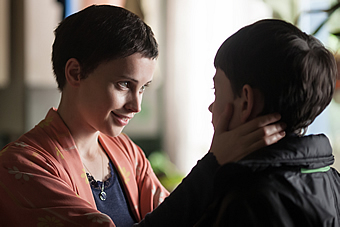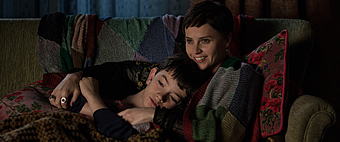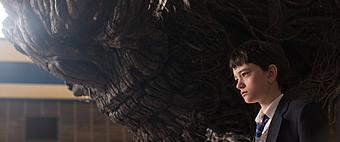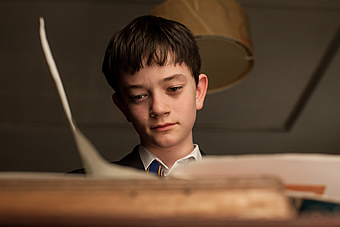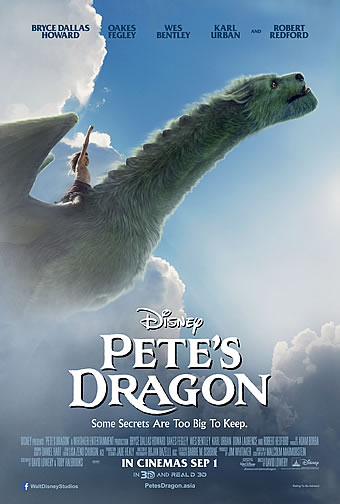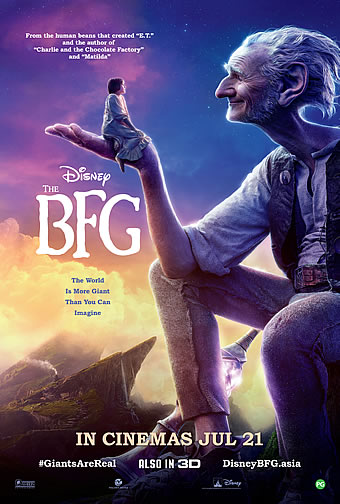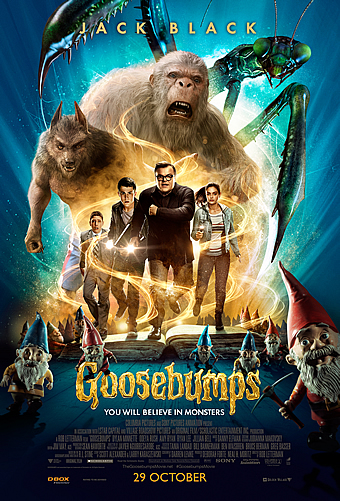A MONSTER CALLS (2016)
Genre: Drama/Fantasy
Director: J.A. Bayona
Cast: Felicity Jones, Lewis MacDougall, Liam Neeson, Toby Kebbell, Sigourney Weaver
Runtime: 1 hr 48 mins
Rating: PG (Some Frightening Scenes)
Released By: Cathay-Keris Films
Official Website:
Opening Day: 20 October 2016
Synopsis: 12-year-old Conor O'Malley (Lewis MacDougall) is about to escape into a fantastical world of monsters and fairy tales. He is dealing with his mother's (Felicity Jones) illness, which has necessitated Conor's spending time with his less-than-sympathetic grandmother (Sigourney Weaver). His daily existence at his U.K. school is one of academic disinterest and bullying by classmates. As Conor's father (Toby Kebbell) has resettled thousands of miles away in the U.S., the boy yearns for guidance. He unexpectedly summons a most unlikely ally, who bursts forth with terrifying grandeur from an ancient towering yew tree and the powerful earth below it: a 40-foot-high colossus of a creature (portrayed in performance-capture and voiceover by Liam Neeson) who appears at Conor's bedroom window @12:07 one night - and at that time on nights thereafter. The Monster has stories to tell, and he insists that Conor hear them and powerfully visualize them. Conor's fear gives way to feistiness and then to looking within; for, The Monster demands that once the tales are told it will be time for Conor to tell his own story in return. Ancient, wild, and relentless, the Monster guides Conor on a journey of courage, faith, and truth.
Movie Review:
‘A Monster Calls’ begins with a single frightening image – twelve-year-old Conor O’ Malley desperately trying to hold on to his mother (Felicity Jones) before she is swallowed by a giant hole beneath the earth atop a grassy knoll with a ramshackle church and a majestic yew tree. Thankfully, it is no more than a nightmare that Conor wakes up from at precisely 12:07 am one night. And yet, Conor’s reality is no less harsh – an absent father (Toby Kibbell) who now lives in Las Vegas with his new family; a mother dying from cancer; a stern grandmother (Sigourney Weaver) who insists he move in with her given his mother’s condition; and three bullies in his class who pick on him from time to time after school. Amidst these bitter facts, Conor has to contend with the arrival of the 12-metre ancient yew tree coming to life as the titular Monster, who tells Conor that he will return on three subsequent nights to tell Conor a story each time before demanding a fourth tale from Conor in return.
Adapted by Patrick Ness from his 2011 best-selling novel, the fantasy drama is in fact a bittersweet, often painful, but deeply moving account of bereavement and growing up, anchored by Conor’s coming to grips with the grim burden of terminal illness and the inevitable death of his mother. As perplexing as they may seem at first, the moral and purpose of each one of the three stories which the Monster narrates in Liam Neeson’s deep gravelly voice will soon become clear – the first concerns a prince waiting to come of age to ascend the throne and his stepmother cum de facto caretaker of the throne; the second is about the rivalry between a pastor and an apothecary; and the third has to do with a loner who is tired of being invisible to the people around him. Not surprisingly, the narrative’s progression is tracked by the sequence of these stories, which also illuminate the Monster’s true mission of teaching and healing (and not of destruction).
This his third feature-length film, Spanish director J.A. Bayona chooses to portray the parables in beautiful watercolour-like animation – and given how the Monster covers Conor’s eyes every time to force the latter to envision each story as vividly as he can, it is clear that the vignettes are products of Conor’s own imagination. The same however cannot be said of Conor’s interactions with the Monster. Is the Monster a mere figment of Conor’s daydreams? Or is the Monster some mysterious creature that is somehow visible only to Conor? Further blurring the lines are the real-life consequences that Conor has to face up to following the Monster’s second and third story – in the former, Conor realizes he has completely obliterated his living room, including his grandmother’s favourite grandfather clock; and in the latter, Conor has assaulted the class bully in the school canteen so badly that the boy has to be sent to the hospital.
Though it may deal with the coming-of-age of a young boy, there should be no mistaking that ‘A Monster Calls’ is dark stuff. Each fable challenges the assumptions arising from binary thinking – it is as the Monster explains, ‘there is no good or bad; most people are somewhere in between’. When telling Conor the story of how he fell in love and married Conor’s mother, his dad says that love stories end ‘messily (rather than happily) ever after’. But most agonizing of all is Conor’s mother’s degeneration as she gets weaker with each unsuccessful treatment, as glimpsed by her gradually emancipating body. No one is ever fully prepared to cope with the process of losing a loved one (though age may make an individual more resilient), and through Conor’s anguish, Bayona illuminates some profound lessons in navigating the vagaries and miseries of life.
It is too easy for such illness-centred family dramas to slip into melodrama, but the masterful Bayona never overplays his victim’s worsening condition or Conor’s descent into anger, frustration and helplessness. There is great finesse in how Bayona depicts Conor’s world of pain and loss, complemented by a raw and gripping performance by British actor Lewis MacDougall as Conor. Each one of his character’s relationships is strongly played with a veritable supporting cast – with Neeson as the Monster who guides Conor through his subconscious fears; with Weaver as his chilly but ultimately affectionate grandmother; and last but not least with Jones as his mother whom he loves beyond words. Keeping the list of characters small lends the character drama an intimate quality, and the impact of these life-changing circumstances on Conor felt even more keenly.
Truth be told, ‘A Monster Calls’ was one of the most poignant experiences we’ve had in a theatre for some time, with every bit of sentiment well-earned by heartfelt storytelling. Indeed, even though it combines fantasy with realism, there is nothing pretentious about its central story of inner turmoil precipitated by intense grief and loss. You may not come away remembering much about its moments of magic, but we guarantee that you’ll have a searing memory of coming to terms and letting go – not only of the people we cannot bear to be apart from but also of our own feelings as a result. Simply put, this is an incredibly touching film with sharp emotional truths and well-observed allegories; to call it a masterpiece is no overstatement.
Movie Rating:





(One of the most profoundly moving experiences we've had in a long while, 'A Monster Calls' mixes fantasy and reality to conjure a bittersweet, often painful, but sharply observed coming-of-age story about bereavement and growing up)
Review by Gabriel Chong
You might also like:
.jpg)
Movie Stills
